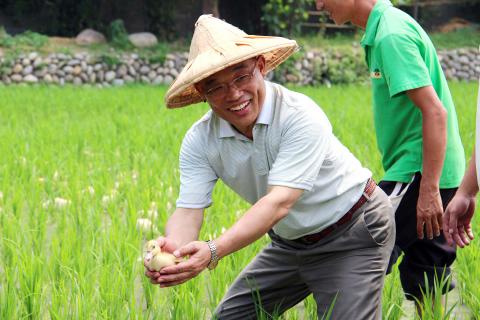President Ma Ying-jeou (馬英九) has betrayed his pledge to divest the assets of the Chinese Nationalist Party (KMT), as a draft political party act passed by the Executive Yuan will not create a level playing field for all political parties, the pan-green camp said yesterday.
According to the draft approved by the Cabinet on Thursday, political parties must not operate or invest in profit-making enterprises and must transfer ownership of or sell off shares in such enterprises within two years of the legislation being enacted. If they failed to sell off the assets at the end of the two-year period, they would have to place them in a trust within six months.
The KMT took over the assets of the Japanese colonial government and countless private businesses and individuals when it fled China and took control of Taiwan after World War II, a move many of its detractors have described as outright theft.

Photo: CNA
The KMT pledged in 2005 to sell all of its assets, which have made it the richest political party in the world, its critics say. The party says it has placed most of its assets in a trust.
“The draft act is disappointing and is a strategy to legalize the status of the KMT’s assets, which have been placed in a trust and have been a disgrace to Taiwan,” DPP spokesperson Lin Chun-hsien (林俊憲) told a press conference yesterday.
Ma has never kept his promise to donate all profits from these assets in trust to charity and not to fund the party’s election campaigns with them, Lin said.
The evidence shows that Ma is a flat-out liar, Lin said, as the KMT earned NT$10.17 billion (US$340 million) from 2006 to last year, with half of the NT$440 million expenditure on Ma’s re-election campaign funded by KMT assets.
DPP Chairman Su Tseng-chang (蘇貞昌), who was touring Miaoli County, said: “Ma has tarnished his credibility and has betrayed his pledge [with the draft political party act] as the KMT’s unjust, ill-gotten assets have been a target of public anger.”
“The move to legalize the assets would arouse more public anger and disgust, and they will use the ballot to punish a party that thinks money can buy everything,” he said.
DPP Legislator Cheng Li-chiun (鄭麗君) said it was shame that Taiwan has yet to pass a political party act 25 years after the lifting of martial law.
However, the “money-laundering-like” draft act, which would ensure that the KMT continues to receive huge dividends, would not change the unbalanced playing field, she said.
She added that the DPP would do whatever it takes to monitor the screening of the act in the upcoming legislative session.
Taiwan Solidarity Union caucus whip Hsu Chung-hsin (許忠信) said the position of his party on the issue has been clear and firm.
“We insist that all the KMT’s ill-gotten assets, including properties, buildings, stocks and cash, should be returned to the national treasury,” Hsu said.

Taiwanese were praised for their composure after a video filmed by Taiwanese tourists capturing the moment a magnitude 7.5 earthquake struck Japan’s Aomori Prefecture went viral on social media. The video shows a hotel room shaking violently amid Monday’s quake, with objects falling to the ground. Two Taiwanese began filming with their mobile phones, while two others held the sides of a TV to prevent it from falling. When the shaking stopped, the pair calmly took down the TV and laid it flat on a tatami mat, the video shows. The video also captured the group talking about the safety of their companions bathing

US climber Alex Honnold is to attempt to scale Taipei 101 without a rope and harness in a live Netflix special on Jan. 24, the streaming platform announced on Wednesday. Accounting for the time difference, the two-hour broadcast of Honnold’s climb, called Skyscraper Live, is to air on Jan. 23 in the US, Netflix said in a statement. Honnold, 40, was the first person ever to free solo climb the 900m El Capitan rock formation in Yosemite National Park — a feat that was recorded and later made into the 2018 documentary film Free Solo. Netflix previewed Skyscraper Live in October, after videos

Starting on Jan. 1, YouBike riders must have insurance to use the service, and a six-month trial of NT$5 coupons under certain conditions would be implemented to balance bike shortages, a joint statement from transportation departments across Taipei, New Taipei City and Taoyuan announced yesterday. The rental bike system operator said that coupons would be offered to riders to rent bikes from full stations, for riders who take out an electric-assisted bike from a full station, and for riders who return a bike to an empty station. All riders with YouBike accounts are automatically eligible for the program, and each membership account

A classified Pentagon-produced, multiyear assessment — the Overmatch brief — highlighted unreported Chinese capabilities to destroy US military assets and identified US supply chain choke points, painting a disturbing picture of waning US military might, a New York Times editorial published on Monday said. US Secretary of Defense Pete Hegseth’s comments in November last year that “we lose every time” in Pentagon-conducted war games pitting the US against China further highlighted the uncertainty about the US’ capability to intervene in the event of a Chinese invasion of Taiwan. “It shows the Pentagon’s overreliance on expensive, vulnerable weapons as adversaries field cheap, technologically